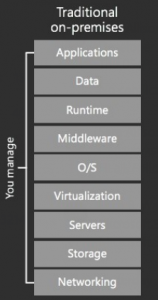Last updated on April 12, 2023
What is IaaS, PaaS, and SaaS?
IaaS, PaaS, and SaaS are three types of cloud computing services provided by Microsoft Azure. Each model has its advantages that help customers meet their specific needs. Each type of cloud computing service, and deployment method, provides you with different levels of control, flexibility, and management.
With traditional on-premises data centers, customers have complete control over the hardware, server, virtualization, and software deployed. Historically, this has led to hardware procurement decisions focusing on scaling up. An example is purchasing a server with more cores to meet peak performance needs. Unfortunately, this infrastructure might be underutilized outside a demand window.
Infrastructure as a service or IaaS
IaaS provides users with virtual computing resources, such as virtual machines, storage, and networking. This helps you avoid the expense and complexity of buying and managing your own physical servers and other data center infrastructure.
IaaS is ideal for organizations that need to run legacy applications or need greater control over their infrastructure. Virtual Machines, Virtual Networks, and some Storage Accounts features are infrastructure as a service offered by Azure.
Platform as a service or PaaS
PaaS allows you to avoid the expense and complexity of buying and managing software licenses, the underlying application infrastructure, middleware, container orchestrators or development tools, and other resources. You control the applications and services you develop, and the cloud service provider manages everything else.
PaaS is ideal for organizations that want to quickly develop and deploy new applications without having to worry about the underlying infrastructure. App Service, Azure Functions, and Azure Kubernetes Service are platforms as a service offered by Azure.
Software as a service or SaaS
SaaS is the highest level of service and gives users access to software applications hosted and maintained by Microsoft. With SaaS, users no longer need to worry about managing the underlying infrastructure or developing and deploying applications, the appropriate service agreement, availability and security of the application, and most importantly, your data because Microsoft takes care of it all. SaaS is ideal for organizations that want to use software applications without having to worry about managing them. Office 365, Dynamics 365, and Power BI are a software as a service offered by Azure.
To summarize, IaaS provides virtual computing resources, PaaS provides a platform for developing and deploying applications, and SaaS provides access to software applications hosted and maintained by Microsoft. Each cloud service offers increased levels of responsibility, allowing organizations to choose the level they require that would fit their needs.





















